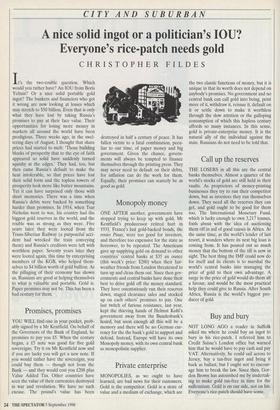CITY AND SUBURBAN
A nice solid ingot or a politician's IOU?
Everyone's rice-patch needs gold
CHRISTOPHER FILDES
It's the two-rouble question. Which would you rather have? An IOU from Boris Yeltsin? Or a nice solid portable gold ingot? The bankers and financiers who got it wrong are now looking at losses which may stretch to $50 billion. Even that is only what they have lost by taking Russia's promises to pay at their face value. Their opportunities for losing more money in markets all around the world have been prodigious. Three weeks ago, in the swel- tering days of August, I thought that share prices had started to melt: 'Those building blocks of prosperity that to the eye of faith appeared so solid have suddenly turned squishy at the edges.' They had, too, but then came Russia's default to make the heat intolerable, so that prices have lost their solid form and the topless towers of prosperity look more like butter mountains. Yet it can have surprised only those with short memories. There was a time when Russia's debts were backed by something harder than promises. In 1914, when Tsar Nicholas went to war, his country had the biggest gold reserves in the world, and the rouble was as strong as they were. Five years later they were looted from the Trans-Siberian Railway (a purposeful acci- dent had wrecked the train conveying them) and Russia's creditors were left with worthless paper. Seventy years later they were looted again, this time by enterprising members of the KGB, who helped them- selves to $4 billion worth of gold bullion. As the pillaging of their economy has shown us, Russians are good at helping themselves to what is valuable and portable. Gold is. Paper promises may not be. This has been a bad century for them.


























































 Previous page
Previous page